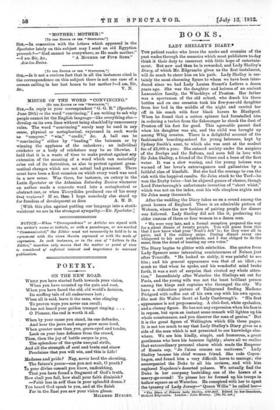MISUSE OF THE' WORD "CONVINCING." [To TER.EnisOs os THU espeereree."1
Stn,—In reply to your correspondent " G. G. R." (Spectator, June 29th) re the word*" convincing," I am writing to ask why people cannot let the English language—like everything else— develop on its own lines without being shackled by unnecessary rides. The word "convincing" surely may be used in any sense, physical or metaphorical, expressed in such words as "conquer," "win," "credit," &c. A ball can be " convincing" either by " beating " the batsman or by Winning the applause of the onlookers ; an individual cricketer or a body of cricketers may be so likewise. I hold that it is a waste of time to make protest against any extension of the meaning of a word which can materially arise out of its derivation, as also to protest against gram- matical changes which are not actual bad grammar. There must have been a first occasion on which every word was used in a new sense. Was there, for instance, an outcry in the Latin Spectator or the Athenian Saturday Review whenever an author made a concrete word into a metaphorical or abstract one, or when Thucydides produced one of his many xeriaEra P If so, then I hope somebody else stood up for freedom of development as does A. H. D. [With this plea against putting our language into a strait- waistcoat we are in the strongest sympathy.—ED. Spectator.]






































 Previous page
Previous page